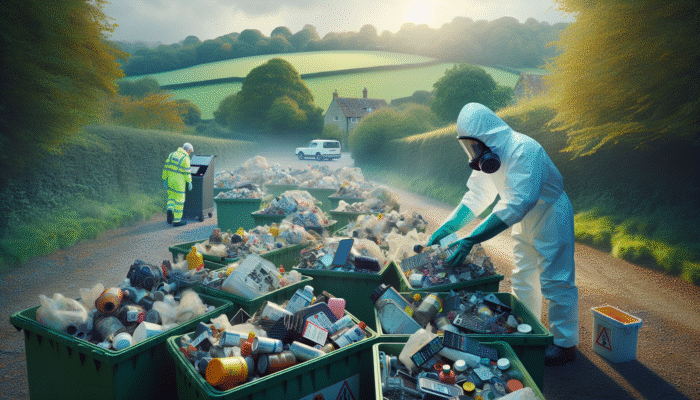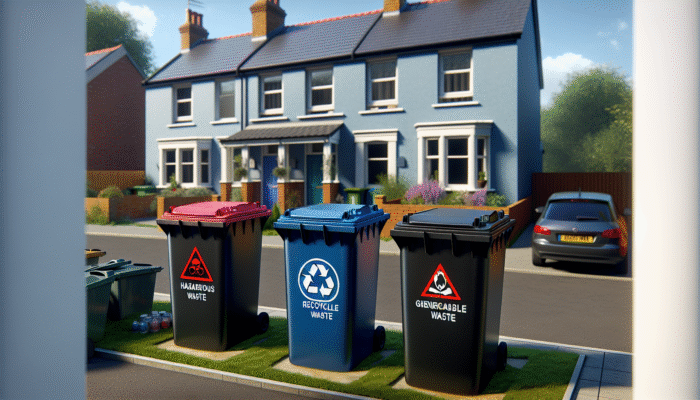Master the Complexities of UK House Clearance Regulations for Legal Compliance and Enhanced Safety
Engaging in house clearance is a vital process that requires an extensive understanding of the legal framework governing such activities within the UK. Compliance with these laws is imperative, as they safeguard both property owners and the environment. By acquiring knowledge about UK house clearance laws, you equip yourself with the tools necessary for executing a compliant and efficient clearance operation. This awareness guarantees that all necessary steps are adhered to, resulting in a seamless and lawful process that aligns with regulatory standards and recognised best practices in the industry.
Clarifying Your Legal Responsibilities in House Clearance Operations

In the UK, conducting a house clearance involves various legal obligations that ensure responsible waste disposal practices. The primary legal framework that governs house clearance is defined in the <a href=”https://birminghamhouseclearance.com/eco-friendly-clearance-techniques-for-sustainable-living-in-the-uk/”>Environmental Protection Act 1990</a>, which stipulates that waste must be handled in a manner that does not jeopardise human health or the environment. Before initiating any clearance activities, it is essential to identify whether the waste consists of hazardous materials, as specific regulations govern their disposal. For example, items such as old paints, solvents, or electronic devices may necessitate special handling and disposal methods to adhere to legal requirements.
Furthermore, maintaining thorough documentation is crucial. If you choose to engage a professional house clearance service, they are obligated to provide you with a waste transfer note. This document serves as vital evidence that the waste is being disposed of in accordance with legal regulations. Such documentation becomes particularly significant if questions arise regarding the disposal methods employed. Neglecting to fulfil these legal duties can lead to substantial fines or legal repercussions, underscoring the necessity for individuals and businesses to be well-informed about their responsibilities in this process.
Securing the Necessary Permits and Licenses for House Clearance
When organising a house clearance in the UK, it is often necessary to obtain specific permits and licenses, depending on the nature of the waste being removed. For instance, if the property contains commercial waste or hazardous materials, special permits from local authorities may be required. Additionally, it is advisable to select a house clearance company that is registered with the Environment Agency, as this registration verifies that the company complies with regulatory standards and is legally authorised to transport and dispose of waste materials.
In some instances, permission may also be required to access communal areas in apartment buildings or residential complexes. It is always prudent to consult local councils regarding any specific regulations that may pertain to your area. Ensuring that all necessary permits are obtained not only protects you legally but also upholds community standards regarding waste management, demonstrating your commitment to responsible practices in the clearance process.
The Consequences of Non-Compliance with House Clearance Regulations
Neglecting to adhere to the laws surrounding house clearance can lead to severe penalties. Local councils possess the authority to impose fines for improper waste disposal, with these fines ranging from hundreds to thousands of pounds, depending on the severity of the infringement. Additionally, individuals or businesses may face civil liabilities if their waste disposal methods result in environmental damage or harm to public health.
For instance, if hazardous materials are disposed of illegally, the responsible party could face prosecution under the Environmental Protection Act, which may lead to criminal charges and a lasting criminal record. Therefore, comprehending the ramifications of non-compliance is essential for anyone involved in the house clearance process to avoid costly errors and legal complications.
Identifying Various Waste Types in UK House Clearance Procedures

House clearance encompasses a range of waste types, each governed by distinct regulations and best practices for disposal. Understanding these classifications is paramount to ensure compliance with UK laws while also promoting environmental responsibility. The primary categories of waste encountered during house clearance include hazardous waste, recyclable materials, and general waste, all of which require careful management and consideration for proper handling and disposal.
Recognising Hazardous Waste and Ensuring Safe Disposal Practices
Hazardous waste presents significant risks to both human health and the environment, making its proper disposal essential. Items such as batteries, chemicals, old paints, and electronic devices fall into this hazardous category. In the UK, the management and disposal of hazardous waste are strictly regulated, with the Hazardous Waste Regulations 2005 outlining the framework for its handling. This includes the requirement for a consignment note that tracks the waste from the point of disposal to its final destination, ensuring accountability throughout the disposal process.
It is highly advisable to collaborate with a registered waste carrier when disposing of hazardous materials. These professionals are trained in the safe handling of such items and possess extensive knowledge regarding the legal obligations surrounding their disposal. Homeowners should also consult their local council guidelines, as many councils offer specialised collection services for hazardous waste. Properly managing hazardous materials not only protects public health but also mitigates the risk of legal repercussions associated with improper disposal practices.
Boosting Recycling Efforts During House Clearance Activities
Recycling is integral to responsible waste management during house clearance, as it aids in reducing landfill waste and conserving valuable resources. Common recyclable materials include paper, cardboard, glass, metal, and certain types of plastics. In the UK, recycling guidelines can differ based on local authority regulations, making it crucial to verify the specific requirements in your area to ensure compliance and effectiveness.
Many councils provide designated recycling bins and specific collection days that facilitate the proper disposal of recyclable materials. When undertaking a house clearance, sorting items into recyclable and non-recyclable categories can significantly minimise the total waste sent to landfills. Additionally, some house clearance companies offer recycling services, ensuring that materials are diverted from landfills and processed in an environmentally responsible manner, thereby embracing sustainability in their operations.
Effective Management of General Waste During House Clearance

General waste consists of non-hazardous items that do not fit into specific recycling categories, including furniture, clothing, and assorted household debris. While disposing of these items may seem straightforward, there are still regulations in place that govern how general waste should be managed effectively.
Homeowners have the option to transport general waste to local disposal sites, which may charge a fee for the service. Alternatively, hiring a professional house clearance service can greatly simplify the disposal process, as these companies have the expertise to manage the necessary legal disposal methods. It is also noteworthy that some local authorities provide bulk waste collection services, offering a convenient solution for disposing of larger items. Practising responsible disposal methods for general waste not only ensures legal compliance but also contributes to a cleaner and healthier environment for everyone involved.
Essential UK House Clearance Regulations for Ensuring Compliance
The regulations governing house clearance in the UK are designed to guarantee ethical and responsible waste management. A thorough understanding of these regulations is crucial for anyone involved in the clearance process, whether as a homeowner, tenant, landlord, or professional service provider. Key aspects of focus include waste management licensing, duty of care, and the Environmental Protection Act, all of which play a significant role in establishing best practices in house clearance.
The Importance of Waste Management Licensing
In the UK, any business involved in waste disposal must hold a waste management license or be registered with the Environment Agency. This requirement applies to house clearance services that must present proof of their licensing before commencing operations. Licensing serves to ensure that these companies operate legally and comply with the necessary standards for waste disposal, thereby safeguarding public health and the environment.
Individuals conducting house clearance for personal reasons are not required to possess a license unless they are transporting waste commercially. Nonetheless, it is essential to verify that any waste disposal company you hire is licensed to handle waste appropriately. Non-compliance with these licensing requirements can lead to legal consequences and significant fines, highlighting the necessity of confirming credentials before engaging any service provider.
Understanding Your Duty of Care in Waste Management Practices
The principle of duty of care in UK waste management places the onus on individuals and businesses to ensure that any waste they generate is disposed of legally and safely. This involves taking reasonable precautions to prevent environmental harm and ensuring that waste is only transferred to authorised carriers.
When arranging a house clearance, it is vital to request a waste transfer note from the service provider. This document serves as evidence that the waste has been handled properly and protects you from potential liabilities should the waste be disposed of improperly by the carrier. Understanding your duty of care is essential for compliance and maintaining a high standard of environmental responsibility throughout the clearance process.
Key Elements of the Environmental Protection Act
The Environmental Protection Act 1990 represents a cornerstone of UK environmental legislation, regulating waste management and its implications for the environment. This Act outlines the duties of both individuals and businesses concerning waste disposal, including activities associated with house clearance.
One of the fundamental aspects of this legislation is that waste must be disposed of in a manner that does not harm the environment or jeopardise public health. The Act also establishes the framework for waste management licensing, reinforcing the necessity for licensed carriers. By adhering to the stipulations outlined in the Environmental Protection Act, participants in the house clearance process can contribute to environmental sustainability while minimising potential legal issues.
Implementing Effective Safety Protocols During UK House Clearance
Carrying out a house clearance can be a physically demanding endeavour and carries inherent risks. To ensure the safety of all individuals involved, it is crucial to implement appropriate safety protocols. This entails the use of personal protective equipment (PPE), proper handling of heavy items, and the establishment of clear emergency procedures. Understanding and adhering to these safety measures is vital for executing a successful and secure house clearance operation.
Utilising Personal Protective Equipment for Enhanced Safety
Personal protective equipment (PPE) is indispensable for safeguarding individuals engaged in house clearance activities. Items such as gloves, masks, goggles, and steel-toed boots provide protection against injuries and health hazards that may arise during the process. Gloves are particularly important when handling potentially sharp or hazardous materials, while masks help prevent the inhalation of dust or toxic substances.
Employers are legally required to furnish suitable PPE to their employees, ensuring they are properly equipped to handle the physical demands of house clearance safely. Homeowners undertaking DIY clearance should also invest in appropriate PPE to mitigate risks throughout the process. By prioritising safety through the use of PPE, all participants can significantly reduce the likelihood of accidents and injuries during house clearance activities.
Implementing Safe Handling Techniques for Heavy Items
When managing heavy items during a house clearance, employing correct lifting techniques is imperative to prevent injuries. Always assess the weight and dimensions of an item before attempting to lift it; if it appears too heavy, seeking assistance or using equipment specifically designed for lifting is advisable. For those handling heavy objects, it is essential to lift with the legs rather than the back, keeping the load close to the body to minimise strain and potential injury.
If feasible, disassembling larger items prior to transportation can simplify handling and reduce the risk of damage to door frames or walls. When working as a team, establishing clear communication to coordinate movements is crucial, ensuring that everyone understands their roles and responsibilities. Prioritising safe handling practices is not only a legal requirement but also a fundamental aspect of ensuring the wellbeing of all individuals involved in the clearance.
Creating Emergency Procedures for House Clearance Operations
Despite meticulous planning, emergencies can occur during house clearance operations. Establishing clear emergency procedures is essential for an effective response. First, identify potential hazards associated with the clearance, such as sharp objects, hazardous materials, or unstable furniture.
All individuals involved should be informed about emergency contact numbers and protocols for various situations, including accidents or unexpected incidents. Designating a person responsible for managing emergencies can streamline communication and response efforts. By ensuring that everyone is prepared for emergencies, house clearance can progress with greater confidence and safety.
Understanding the Interplay Between UK House Clearance and Property Law
The relationship between house clearance and property law is a significant consideration for landlords, tenants, and homeowners alike. Comprehending the legal responsibilities associated with property clearance is vital to avoid disputes and ensure adherence to relevant regulations. Key areas of focus include tenant and landlord obligations, estate clearance procedures, property damage liability, and the proper disposal of hazardous materials.
Clarifying Responsibilities for Tenants and Landlords in House Clearance Situations
In the UK, both tenants and landlords possess specific responsibilities concerning house clearance. Tenants are typically obligated to remove personal belongings and ensure the property is left in good condition upon vacating. Failure to meet these responsibilities may result in deductions from their security deposit.
Conversely, landlords are accountable for ensuring that the property complies with safety standards and that any necessary house clearance is carried out lawfully and ethically. If a landlord must clear a property after a tenant has vacated, they must adhere to the appropriate legal procedures, including notifying the tenant about any items left behind. Clear communication between landlords and tenants is critical to preventing misunderstandings and ensuring a seamless transition.
Navigating Estate Clearance Following a Death
Clearing an estate after a death can be an emotionally challenging process, further complicated by legal intricacies. Executors of the estate are often tasked with overseeing the clearance of the deceased’s possessions. It is crucial to respect the wishes of the deceased as outlined in their will, ensuring that valuable items are distributed appropriately.
Before commencing the clearance, it is advisable to obtain a grant of probate, as this legal document empowers the executor to manage the estate. During the clearance, items of sentimental value should be identified and preserved, while any remaining possessions need to be assessed for their worth. Engaging a professional house clearance service experienced in estate clearance can alleviate some burdens and ensure compliance with legal requirements throughout the process.
Understanding Liability for Property Damage During House Clearance
Liability for property damage incurred during house clearance can lead to disputes among the parties involved. Individuals conducting their own clearances should exercise caution to avoid causing damage to the property, as they may be held financially accountable for any necessary repairs.
When hiring a professional house clearance service, it is essential to clarify liability terms within the service agreement. Reputable companies should carry insurance that covers potential damages, providing peace of mind to property owners. Understanding liability for property damage is fundamental, as it protects all parties involved from unexpected financial burdens during the clearance process.
Essential Legal Requirements for House Clearance Operations
Navigating the legal requirements associated with house clearance in the UK can be daunting. It is vital to have a comprehensive understanding of the permissions necessary before initiating the clearance process. This includes obtaining any required permits, particularly if the clearance involves hazardous or commercial waste.
Always consult local councils for specific regulations that may apply to your location, as legal requirements can vary across regions. Additionally, if you engage a house clearance service, ensure that they are licensed and insured, confirming compliance with all legal obligations. By thoroughly familiarising yourself with the legal requirements for house clearance, you can facilitate a smooth, compliant process while minimising potential legal complications.
Ensuring Safe Disposal of Hazardous Materials During House Clearance
The disposal of hazardous materials during house clearance is a critical aspect of adhering to UK law. As previously mentioned, hazardous items necessitate special handling and disposal procedures to avert harm to individuals and the environment. Regulations stipulate that hazardous materials must be transported to licensed disposal facilities equipped to handle such waste safely and responsibly.
Given the complexities involved, it is advisable to enlist a professional service experienced in hazardous waste management. These experts will ensure compliance with all relevant regulations and provide the necessary documentation for the disposal process. Homeowners must never attempt to dispose of hazardous materials in regular waste containers, as this can lead to significant legal penalties and environmental degradation.
Environmental Considerations in UK House Clearance Practices
Acting in an environmentally responsible manner during house clearance is not only a legal obligation but also a moral imperative. Understanding the environmental impact of waste disposal and taking actionable measures to minimise that impact is essential for fostering sustainability. Key considerations include guidelines for utilising waste disposal sites, engaging in recycling initiatives, and strategies for mitigating environmental harm associated with waste management.
Utilising Waste Disposal Sites Responsibly
Waste disposal sites play a pivotal role in managing the waste generated during house clearance. When utilising these facilities, it is crucial to verify that they are licensed and comply with regulations set forth by the local council. Many councils operate designated sites for various waste types, including general waste, recyclable materials, and hazardous waste, ensuring proper management and disposal.
Before transporting items to a waste disposal site, it is advisable to sort through materials to identify what can be recycled. Some sites provide recycling facilities that enable homeowners to significantly reduce their contributions to landfills. Familiarising yourself with the local disposal site’s rules and guidelines ensures compliance and fosters responsible waste management practices that benefit both the environment and the community.
Engaging in Recycling Initiatives for Sustainable Waste Management Practices
Recycling initiatives are a vital aspect of sustainable house clearance practices. Numerous local councils in the UK promote recycling through educational programmes and community workshops. Participating in these initiatives not only benefits the environment but can also inspire individuals to adopt more sustainable habits within their households.
During house clearance, homeowners should make a concerted effort to separate recyclable materials from non-recyclable waste. Many charity shops and community organisations accept donations of usable items, promoting reuse and reducing the volume of waste that ends up in landfills. Actively engaging in recycling initiatives contributes to a more sustainable future and aligns with the growing societal focus on environmental responsibility.
Assessing the Impact of House Clearance on the Local Environment
The effects of house clearance on the local environment should not be underestimated. Improper waste disposal can lead to pollution, harm wildlife, and pose health risks to surrounding communities. Therefore, it is essential to adopt best practices for waste management, including thorough sorting, recycling, and engaging licensed waste carriers for disposal.
It is also imperative to consider the environmental footprint of the clearance process itself. For example, minimising vehicle trips by consolidating loads can significantly reduce emissions. By being mindful of the environmental consequences of house clearance, individuals and companies can make positive contributions to their communities and the planet as a whole, fostering a more sustainable and healthy environment for future generations.
Ensuring Safe Handling of Hazardous Materials During Clearance Operations
Handling hazardous materials during house clearance necessitates a comprehensive understanding of safety protocols and legal requirements. These materials, which may include chemicals, batteries, and electronic waste, require meticulous management to prevent exposure or contamination of the environment.
Always utilise appropriate protective gear when handling hazardous items. Furthermore, ensure that these materials are securely stored until they can be transported to a licensed disposal facility. Engaging a professional service skilled in hazardous waste management can greatly streamline this process while ensuring compliance with all applicable laws and regulations.
Adopting Sustainable Practices in House Clearance Initiatives
Implementing sustainable practices during house clearance not only aids in environmental protection but also fosters a culture of responsibility within communities. Strategies such as minimising waste, reusing items, and recycling should be central to any clearance operation, emphasising environmental stewardship.
Consider conducting a thorough assessment of items prior to disposal, identifying anything suitable for donation, repurposing, or recycling. Collaborating with local charities can also assist in diverting items from landfills while supporting community initiatives. By adopting sustainable practices, households can contribute to minimising their environmental footprint and promoting a cleaner, greener future for all.
Guidance for Engaging Professionals in UK House Clearance Services
When navigating the complexities of house clearance, enlisting the services of a professional can simplify the process and ensure adherence to legal regulations. However, selecting the right company necessitates careful consideration of various factors, including reputation, cost, and environmental practices.
Criteria for Selecting a Reputable House Clearance Company
Choosing a reputable house clearance company is essential for ensuring a smooth and compliant process. Start by conducting thorough research, seeking out companies with positive reviews and testimonials from prior clients. Online platforms and local directories can provide valuable insights into the professionalism and reliability of various services.
Additionally, ask for recommendations from friends or family members who may have recently undergone a house clearance. A reputable company should be transparent about their processes, including how they manage waste disposal and recycling. Don’t hesitate to inquire about their experience, qualifications, and compliance with UK regulations to ensure you make a well-informed choice.
Evaluating Cost Factors for House Clearance Services
Budgeting for professional house clearance services involves considering numerous factors. Costs can vary significantly based on the property’s size, the volume of waste, and the types of materials to be cleared. It is prudent to obtain multiple quotes from different companies, ensuring that you understand what services are included in each estimate.
Be cautious of prices that appear too good to be true, as they may indicate hidden fees or subpar services. Discuss any additional costs, such as those related to hazardous waste disposal or transportation, and ensure that you receive a clear breakdown of all charges. Understanding the cost implications will assist you in managing your budget effectively while ensuring that you receive quality service.
The Importance of Clear Service Agreements in House Clearance
Establishing clear service agreements with house clearance professionals is vital for delineating expectations and responsibilities. Before commencing any work, ensure that you have a written agreement outlining the scope of services provided, timelines, and payment terms. This documentation not only protects both parties but also helps prevent misunderstandings throughout the clearance process.
In the service agreement, clearly specify the type of waste being cleared and the methods of disposal, including any recycling initiatives the company will implement. This written record becomes invaluable should any disputes arise, ensuring that both parties remain accountable to their commitments.
Verifying Licensing and Insurance for House Clearance Companies
Confirming that your chosen house clearance company possesses the necessary licenses and insurance is vital for ensuring a compliant and safe clearance operation. A licensed company demonstrates adherence to UK waste regulations and is legally permitted to manage waste disposal.
Insurance coverage protects you from potential liabilities arising from accidents or injuries during the clearance process. Always request proof of insurance and scrutinise the terms to confirm adequate coverage. By prioritising licensing and insurance, you can engage with peace of mind, knowing you are working with a responsible and legally compliant service provider.
Selecting Environmentally Responsible House Clearance Services
Choosing house clearance services that prioritise environmental responsibility is crucial for promoting sustainability. Look for companies that adhere to eco-friendly disposal methods, such as recycling and reusing materials. This approach not only reduces landfill waste but also aligns with the growing societal expectation for environmental consciousness.
Inquire about the company’s recycling initiatives and their approach to hazardous waste management. Responsible companies typically provide clear documentation regarding their disposal methods, ensuring compliance with environmental laws. By selecting a service that emphasises eco-friendly practices, you contribute to a more sustainable future while ensuring a responsible house clearance process.
Valuable DIY Strategies for Efficient UK House Clearance
For those opting for a do-it-yourself approach to house clearance, meticulous planning and preparation are essential for achieving a successful outcome. Understanding how to effectively sort and organise items can significantly streamline the process and minimise waste.
Strategic Planning and Preparation for House Clearance
Effective planning is the cornerstone of a successful DIY house clearance. Begin by establishing clear objectives regarding what you wish to accomplish, whether it’s decluttering a single room or clearing an entire property. Set a realistic timeline for the clearance process, allowing ample time for sorting, disposal, and any necessary repairs.
Before initiating the clearance, gather the required supplies, including boxes, bags, and protective gear. Consider creating an inventory of the items being cleared, categorising them into groups for recycling, donation, or disposal. Adopting a structured approach enhances efficiency and diminishes the likelihood of overlooking significant items during the clearance process.
Efficient Sorting and Organising Techniques for House Clearance
Sorting and organising items during house clearance is critical for maximising efficiency and minimising waste. Start by addressing one room or area at a time, categorising items into distinct groups: keep, donate, recycle, and dispose. This systematic approach simplifies decision-making and helps you maintain focus and momentum throughout the process.
For items you intend to keep, consider organising them into storage boxes or bins, clearly labelling them for quick access. For items earmarked for donation, research local charities that accept specific items, ensuring they are in good condition prior to donation. This proactive sorting approach guarantees that valuable items are reused or recycled, positively contributing to the community while lessening landfill waste.
Addressing Common FAQs Related to House Clearance
What legal requirements must be adhered to for house clearance in the UK?
The legal requirements for house clearance in the UK include compliance with the Environmental Protection Act, obtaining necessary permits, and ensuring proper waste disposal through licensed carriers.
Is a permit necessary for house clearance?
You may require a permit if you are disposing of hazardous waste or conducting a commercial clearance. Always consult local regulations for specific requirements applicable to your area.
How should hazardous waste be managed during clearance?
Hazardous waste should be handled with care and disposed of by licensed professionals. Adhering to local guidelines for safe handling and disposal is essential to avoid legal repercussions.
How can I identify a trustworthy house clearance company?
Seek companies with positive reviews, appropriate licensing, and valid insurance. Asking for recommendations from trusted sources can also help you identify reputable services.
What are the repercussions of failing to comply with house clearance laws?
Non-compliance with house clearance laws can incur hefty fines, legal action, and damage to your reputation. Always ensure adherence to regulations to avoid these serious consequences.
Can items be recycled during house clearance?
Absolutely, you can recycle items during house clearance. Sort materials into recyclable categories and check with local councils for specific recycling initiatives available in your area.
What costs should I consider when hiring a house clearance service?
Costs can vary depending on the volume of waste, property size, and services provided. Obtain multiple quotes to effectively evaluate cost considerations and ensure value for money.
What types of insurance should a house clearance company possess?
A reputable house clearance company should maintain public liability insurance to cover any damages or injuries occurring during the clearance process, safeguarding all parties involved.
Is it advisable to undertake house clearance myself or hire professionals?
While hiring professionals can alleviate the complexities involved and ensure compliance with regulations, if you choose to do it yourself, thorough planning and preparation are critical for success.
How can safety be ensured during DIY house clearance?
Utilise appropriate personal protective equipment, follow safe lifting techniques, and establish emergency procedures to ensure safety during DIY house clearance operations.
Connect with us on Facebook for more insights!
The Article: Laws for UK House Clearance Explained: A Comprehensive Guide Was First Found At https://birminghamhouseclearance.com
The Article UK House Clearance Laws Explained: Your Essential Guide Was Found On https://limitsofstrategy.com

